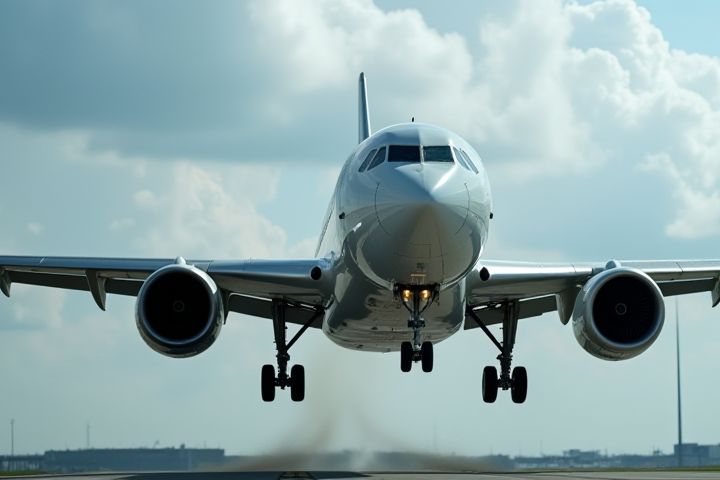
Aviation in Nigeria plays a crucial role in connecting the country to global markets and enhancing domestic travel. The Nigerian Civil Aviation Authority (NCAA) regulates the sector, ensuring safety standards and compliance with international conventions. Major airports include Murtala Muhammed International Airport in Lagos and Nnamdi Azikiwe International Airport in Abuja, which handle significant passenger and cargo traffic. Nigeria's growing airline industry features both established carriers like Arik Air and Air Peace, as well as emerging low-cost airlines. Infrastructure investment and modernization efforts are ongoing, aimed at improving efficiency and passenger experience across the aviation landscape.
Murtala Muhammed International Airport
Murtala Muhammed International Airport (MMIA), located in Lagos, Nigeria, serves as the country's primary international gateway, connecting travelers to various destinations across the globe. The airport is named after General Murtala Muhammed, a former head of state, and features modern facilities, including two main terminals catering to both domestic and international flights. MMIA plays a vital role in Nigeria's economy by facilitating trade, tourism, and regional connectivity while supporting the growing demand for air travel. As the main hub for numerous airlines, it enhances Nigeria's position in West African aviation, making it a crucial player in the continent's air transport network.
Nigerian Civil Aviation Authority
The Nigerian Civil Aviation Authority (NCAA) plays a pivotal role in regulating and promoting safe aviation practices in Nigeria. Established in 2006, the NCAA oversees the implementation of international standards set forth by the International Civil Aviation Organization (ICAO). Your involvement in understanding NCAA's policies can enhance awareness of air travel regulations and safety protocols that impact Nigerian skies. With a commitment to fostering growth and development, the NCAA aims to improve infrastructure and operational efficiency within the country's aviation sector.
Arik Air
Arik Air stands as Nigeria's largest airline, significantly contributing to the nation's aviation landscape. Established in 2006, it operates a modern fleet, offering domestic and international flights, which enhances connectivity across major cities. The airline has received recognition for its service quality, including awards for on-time performance and customer satisfaction. With strategic initiatives in place, such as fleet modernization and route expansion, Arik Air aims to strengthen its position within the competitive African aviation market.
Air Peace
Air Peace, Nigeria's largest airline, significantly shapes the aviation landscape by operating both domestic and international routes. With a modern fleet that includes Boeing 737s and Embraer 195s, the airline prioritizes passenger comfort and operational efficiency. Air Peace's commitment to promoting local tourism and providing affordable air travel options makes it a vital player in Nigeria's economic growth. You can experience a range of services, from on-time performance to varied flight schedules, underscoring their dedication to customer satisfaction.
FAAN (Federal Airports Authority of Nigeria)
The Federal Airports Authority of Nigeria (FAAN) is responsible for managing and maintaining 22 airports across the country, ensuring safety, security, and efficient operations. FAAN plays a critical role in enhancing air travel infrastructure, facilitating economic growth, and creating job opportunities within the aviation sector. It oversees the development of airport facilities, including terminals, runways, and navigation systems, to meet international standards and improve passenger experiences. By promoting partnerships with private entities and investing in technology, FAAN aims to modernize Nigeria's aviation landscape and increase the competitiveness of its airports in the global market.
International Air Transport Association (IATA) membership
Nigeria's aviation sector is heavily influenced by its membership in the International Air Transport Association (IATA), which enhances global connectivity and trade. IATA membership enables Nigerian airlines to adopt international standards for safety and efficiency, improving operational capabilities and passenger experience. The association also provides crucial support through regulatory guidance, training programs, and industry advocacy, fostering a competitive environment. Emphasizing compliance with IATA regulations is essential for expanding your airline's market reach and boosting tourism in Nigeria.
Flight Safety Standards and Regulation
Nigeria's aviation sector prioritizes flight safety standards and regulations, ensuring the protection of passengers and crew. The Nigerian Civil Aviation Authority (NCAA) plays a crucial role in enforcing these regulations, which align with international best practices established by the International Civil Aviation Organization (ICAO). Comprehensive safety audits and rigorous training programs for airline personnel enhance operational safety across the industry. You can expect that adherence to these stringent regulations fosters a more reliable and secure flying experience in Nigeria's airspace.
Indigenous Carrier Growth
Nigeria's aviation sector is experiencing significant growth due to the rise of indigenous carriers, which are crucial for enhancing domestic connectivity and boosting the national economy. Emerging airlines are investing in modern fleets and advanced technology, improving passenger experience and operational efficiency. These local carriers are strategically targeting regional routes, making air travel more accessible and affordable for Nigerians. As the government supports this growth through policy reforms and infrastructure development, the potential for a thriving aviation market in Nigeria becomes increasingly tangible.
Aviation Infrastructure Development
Aviation infrastructure development in Nigeria is vital for enhancing the efficiency and safety of air transport. Investment in modern airports, including the expansion and renovation of existing facilities, improves passenger experience and cargo capacity. In addition, the government's initiatives, like the establishment of the Aviation Development Fund, aim to stimulate private sector participation in infrastructure projects. Upgrading air traffic management systems and navigational aids further supports the growing airline industry, fostering increased connectivity within Africa and internationally.
West African Aviation Hub Potential
Nigeria is positioning itself as a pivotal West African aviation hub due to its strategic geographic location and burgeoning population. The country's major airports, such as Murtala Muhammed International Airport in Lagos and Nnamdi Azikiwe International Airport in Abuja, serve as critical gateways for international and regional air traffic. Investments in aviation infrastructure, including modern terminal facilities and expanded runway capacities, are enhancing operational efficiency and safety. As Nigeria enhances regulatory frameworks and embraces technology, it creates a conducive environment for airlines and passengers, bolstering its status as a preferred hub for air travel in West Africa.
